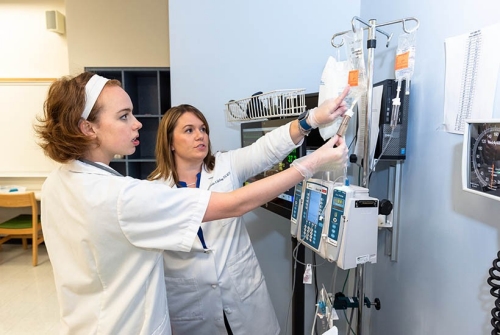YONE Faculty Profile: Dr. Michelle McKay
In this Year of the Nurse Educator, the Fitzpatrick College of Nursing is proud to feature faculty and why they do what they do.
Michelle A. McKay PhD, RN, CCRN is an Assistant Professor

Why did you seek this role?
After working as a bedside nurse for a couple years after my graduation, I always enjoyed being paired with nursing students and orienting new staff members. When considering returning to school for a master’s degree, education was a natural next step because I enjoyed sharing my nursing expertise with students and novice nurses. I decided to continue my education with a PhD to build my research experience while also teaching not only in the clinical arena, but also in the classroom.
How did you become a Nurse Educator?
After receiving my master’s degree in nursing education, I worked for 5 years as an adjunct clinical instructor while still working at the bedside. I then pursued my PhD and began working full time as an educator and researcher.
What do you like about your role?
The best part is sharing my passion for critical care nursing with my students. I love sharing the nursing process that is required in a critical care environment. I also hope that I convey what a privilege it is to care for patients and families in their most difficult times. Providing emotional support for patients and families is just as important as titrating blood pressure medications. I continue to work at the bedside per diem. This clinical role informs my teaching and keeps me up to date on the ever-changing critical care environment. I think my students appreciate that I can share real patient stories with them and bring the theory content to life within the classroom.
Best moment as an educator?
Many of our Villanova students work in the area as our nursing colleagues. It is amazing to see students turned nurses excel in the clinical environment. I am so humbled when they share that having me as their professor in class or in clinical helped them decide to become a critical care nurse. A recent graduate shared that she wanted to be like me when she “grew up” and that my love of nursing made them excited for a career in critical care. That is the ultimate compliment.
Advice for someone who is considering it?
Do it! Enroll in a master’s level program or in a post-master's certificate program to learn the skill of teaching. Although I learned how to teach at the bedside, my higher education was critical to developing the theory and practice necessary for me to be an effective educator. Seek out other educators to ask advice, to learn from, to mentor you in the educator role. Just like you never stop learning as a nurse, you will never stop learning as a teacher. Continue to learn from mentors, fellow colleagues, and your students. Always be open to learning more to improve your practice as a nurse educator and to help support our future effective and successful nurses.
